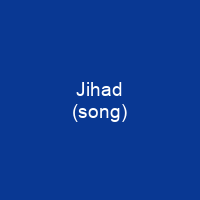“Jihad” is a song by American thrash metal band Slayer. It appears on the band’s 2006 studio album Christ Illusion. The song portrays the imagined viewpoint of a terrorist who has participated in the September 11, 2001 attacks. The climax of the song features spoken text taken from a motivational letter left behind by Mohamed Atta.
About Jihad (song) in brief

It has been compared to Slayer’s 1986 track ‘Angel of Death’, which similarly caused outrage at the time of its release. The band has defended the song, saying that it has the ‘coolest angle’ on the album and is ‘not political at all’ It has also been criticised for being too similar to Steve Earle’s track ‘John Walker’s Blues’, written from the perspective of a Taliban member captured during the 2001 US-led invasion of Afghanistan. In an interview, guitarist Kerry King said that the band was not attempting to promote the terrorists’ perspective of the war, nor their ideological beliefs, although he expected others to assume Slayer was doing so. He also said that Slayer felt they had to present an alternative viewpoint.
You want to know more about Jihad (song)?
This page is based on the article Jihad (song) published in Wikipedia (as of Nov. 05, 2020) and was automatically summarized using artificial intelligence.







